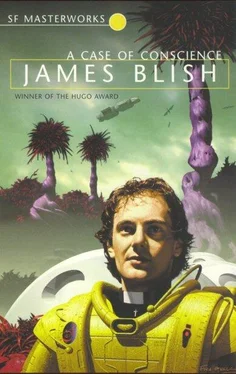The wooden cuckoo clock, meanwhile, ticked evenly away. A quail emerged from one of two wooden doors every quarter of an hour and let you know about it, and on the hour first the quail came out, then the cuckoo, and there was a soft bell that rang just ahead of each cuckoo call. Midnight and noon were not just times of the day for that clock; they were productions. It was accurate to a minute a month, all for the price of running up the three weights which drove it, each night before bedtime. The clock’s maker had been dead before Ruiz-Sanchez was born. In contrast, the priest would probably buy and jettison at least a dozen cheap electric clocks in the course of one lifetime, as their makers had intended he should; they were linearly descended from “planned obsolescence,” the craze for waste which had hit the Americas during the last half of the previous century.
“I’m sure it is,” he said humbly. “I have one more question, if I may. It is really part of the same question. I have asked you if you die; now I should like to ask how you are born. I see many adults on your streets and sometimes in your houses-though I gather you yourself are alone-but never any children. Can you explain this to me? Or if the subject is not allowed to be discussed-”
“But why should it not be? There can never be any closed subjects,” Chtexa said. “Our women, as I’m sure you know, have abdominal pouches where the eggs are carried. It was a lucky mutation for us, for there are a number of nest-robbing species on this planet.”
“Yes, we have a few animals with a somewhat similar arrangement on Earth, although they are viviparous.”
“Our eggs are laid in these pouches once a year,” Chtexa said. “It is then that the women leave their own houses and seek out the man of their choice to fertilize the eggs. I am alone because, thus far, I am no woman’s first choice this season; I will be elected in the Second Marriage, which is tomorrow.”
“I see,” Ruiz-Sanchez said” carefully. “And how is the choice determined? Is it by emotion, or by reason alone?”
“The two are in the long run the same,” Chtexa said. “Our ancestors did not leave our genetic needs to chance. Emotion with us no longer runs counter to our eugenic knowledge. It cannot, since it was itself modified to follow that knowledge by selective breeding for such behavior.”
“At the end of the season, then, comes Migration Day. At that time all the eggs are fertilized, and ready to hatch. On that day-you will not be here to see it, I am afraid, for your scheduled date of departure precedes it by a short time-our whole people goes to the seashores. There, with the men to protect them from predators, the women wade out to swimming depth, and the children are born.”
“In the sea?” Ruiz-Sanchez said faintly.
“Yes, in the sea. Then we all return, and resume our other affairs until the next mating season.”
“But-but what happens to the children?”
“Why, they take care of themselves, if they can. Of course many perish, particularly to our voracious brother the great fish-lizard, whom for that reason we kill when we can. But a majority return home when the time comes.”
“Return? Chtexa, I don’t understand. Why don’t they drown when they are born? And if they return, why have we never seen one?”
“But you have,” Chtexa said. “And you have heard them often. Can it be that you yourselves do not—ah, of course, you are mammals; that is doubtless the difficulty. You keep your children in the nest with you; you know who they are, and they know their parents.”
“Yes,” Ruiz-Sanchez said. “We know who they are, and they know us.”
“That is not possible with us,” Chtexa said. “Here, come with me; I will show you.”
He arose and led the way out into the foyer. Ruiz-Sanchez followed, his head whirling with surmises.
Chtexa opened the door. The night, the priest saw with a subdued shock, was on the wane; there was the faintest of pearly glimmers in the cloudy sky to the east. The multifarious humming and singing of the jungle continued unabated. There was a high, hissing whistle, and the shadow of a pterodon drifted over the city toward the sea. Out on the water, an indistinct blob that could only be one of Lithia’s sailplaning squid broke the surface and glided low over the oily swell for nearly sixty yards before it hit the waves again. From the mud flats came a hoarse barking.
“There,” Chtexa said softly. “Did you hear it?”
The stranded creature, or another of its kind—it was impossible to tell which—croaked protestingly again.
“It is hard for them at first,” Chtexa said. “But actually the worst of their dangers are over. They have come ashore.”
“Chtexa,” Ruiz-Sanchez said. “Your children—the lung-fish?”
“Yes,” Chtexa said. “Those are our children.”
In the last analysis it was the incessant barking of the lung-fish which caused Ruiz-Sanchez to stumble when Agronski opened the door for him. The late hour, and the dual strains of Cleaver’s illness and the subsequent discovery of Cleaver’s direct lying, contributed. So did the increasing sense of guilt toward Cleaver which the priest had felt while walking home under the gradually brightening, weeping sky; and so, of course, did the shock of discovering that Agronski and Michelis had arrived some time during the night while he had been neglecting his charge to satisfy his curiosity.
But primarily it was the diminishing, gasping clamor of the children of Lithia, battering at his every mental citadel, all the way from Chtexa’s house to his own.
The sudden fugue lasted only a few moments. He fought his way back to self-control to find that Agronski and Michelis had propped him up on a stool in the lab and were trying to remove his mackintosh without unbalancing him or awakening him—as difficult a problem in topology as removing a man’s vest without taking off his jacket. Wearily, the priest pulled his own arm out of a mackintosh sleeve and looked up at Michelis.
“Good morning, Mike. Please excuse my bad manners.”
“Don’t be an idiot,” Michelis said evenly. “You don’t have to talk now, anyhow. I’ve already spent much of tonight trying to keep Cleaver quiet until he’s better. Don’t put me through it again, please, Ramon.”
“I won’t. I’m not ill; I’m just tired and a little overwrought.”
“What’s the matter with Cleaver?” Agronski demanded. Michelis made as if to shoo him off.
“No, no, Mike, it’s a fair question. I’m all right, I assure you. As for Paul, he got a dose of glucoside poisoning when a plant spine stabbed him this afternoon. No, it’s yesterday afternoon now. How has he been since you arrived?”
“He’s sick,” Michelis said. “Since you weren’t here, we didn’t know what to do for him. We settled for two of the pills you’d left out.”
“You did?” Ruiz-Sanchez slid his feet heavily to the floor and tried to stand up. “As you say, you couldn’t have known what else to doubt you did overdose him. I think I’d better look in on him—”
“Sit down, please, Ramon.” Michelis spoke gently, but his tone showed that he meant the request to be honored. Obscurely glad to be forced to yield to the big man’s well-meant implacability, the priest let himself be propped back on the stool. His boots fell off his feet to the floor.
“Mike, who’s the Father here?” he asked tiredly. “Still, I’m sure you’ve done a good job. He’s in no apparent danger?”
“Well, he seems pretty sick. But he had energy enough to keep himself awake most of the night. He only passed out a short while ago.”
“Good. Let him stay out. Tomorrow we’ll probably have to begin intravenous feeding, though. In this atmosphere one doesn’t give a salicylate overdose without penalties.” He sighed.
Читать дальше











